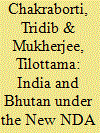| Srl | Item |
| 1 |
ID:
148583


|
|
|
|
|
| Summary/Abstract |
A major part of the year 2011, following the Jasmine Revolution in Tunisia, witnessed what is popularly known as the Arab Spring- people’s struggle against authoritarian regimes in the Middle East. Similar struggles and wide spread political changes, though not as spectacular as in the Arab world, have swept across South Asian nations since 2008. They might not have caught global attention like the events in the Middle East, but nonetheless, there significance for South Asia region can hardly be overlooked. Beginning with the general elections in Pakistan in February 2008, that put the Pakistan People’s Party at the helm of affairs and that eventually saw the end of General Pervez Musharraf’s military regime of nine years, more fundamental changes were brought about in the two Himalayan Kingdoms of Bhutan and Nepal in quick succession in the same year.
|
|
|
|
|
|
|
|
|
|
|
|
|
|
|
|
| 2 |
ID:
139875


|
|
|
|
|
| Summary/Abstract |
Bhutan has grown enormously from the special relations it has had with India in all facets of its progress as a nation. It has matured in international stature and its sovereignty is altogether recognized. Economically, India has assisted in its all round expansion. Further, India has remained firm on its promise that it will not interfere in the domestic matters of Bhutan. This paper examines and compares international trade in and between the two economies and to draw implications for both the economies.
|
|
|
|
|
|
|
|
|
|
|
|
|
|
|
|
| 3 |
ID:
133896


|
|
|
|
|
| Publication |
2014.
|
| Summary/Abstract |
India has always shared a convivial relation with Bhutan. This article traces the historical background of the bilateral relations, attempting to investigate why Bhutan, despite being tiny in size, is so important even after the change of Government in India. Pragmatically, the new Prime Minister of India, Narendra Modi, stated his foreign policy by selecting Bhutan as his first trip abroad. What are the promises that Modi has made to Bhutan? Who all have raised objections to Modi's plans for Bhutan and why? How important is the China factor in developing the India-Bhutan relations?
|
|
|
|
|
|
|
|
|
|
|
|
|
|
|
|
| 4 |
ID:
095944


|
|
|
|
|
| Publication |
2010.
|
| Summary/Abstract |
The India-Bhutan relationship is perhaps the only bilateral engagement in South Asia, yielding high dividends to both parties. While Bhutan all through the years has appreciated India for its economic assistance, India, for its part, has been sensitive to Bhutan's developmental needs. The relationship has helped Bhutan shape a unique developmental trajectory based on gross national happiness. Bhutan's economy has grown substantially in recent years. However, the development cooperation between the two countries can be effectively divided into three significant waves. The first wave (1960s-1970s) focused on building the social and physical infrastructure. The second wave (1980s-1990s) saw substantive efforts towards democratisation and decentralisation. The third wave of the relationship focused on developing hydel projects, which has now expanded into other areas such as information technology, disaster risk management, education and research cooperation.
|
|
|
|
|
|
|
|
|
|
|
|
|
|
|
|